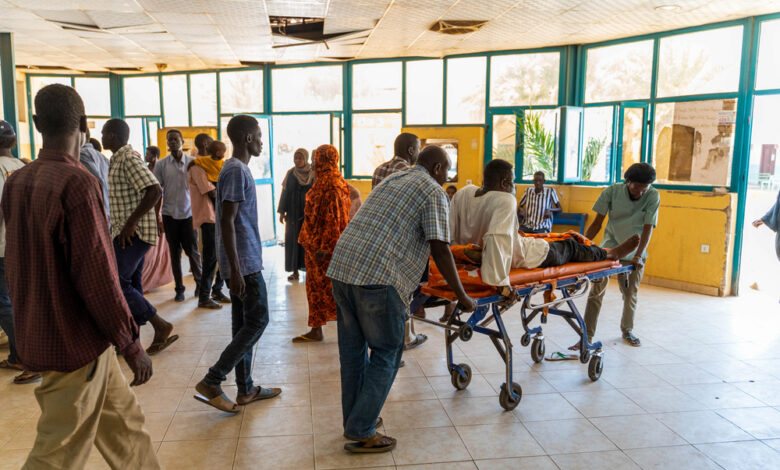MSF Raises Concern Over Worsening Humanitarian Situation As Sudan Crisis Enters Sixth Month
The aid group said visa restrictions, administrative bottlenecks, paucity of funds, shortage of drugs, and closed medical facilities may put the northeastern African country’s health system on the brink of collapse.

Medical relief organisation, Médecins Sans Frontières (MSF) has expressed concerns over the deteriorating humanitarian situation in Sudan during a virtual media briefing to mark six months of its continuous intervention in the crisis.
It said that the crisis in Sudan is taking a heavy toll on civilians in the country.
“Sudan’s crisis epitomises a catastrophic failure of humanity, marked by the warring parties’ failing to protect civilians or facilitate essential humanitarian access, and by the dire neglect and shortcomings of international organisations in delivering an adequate response,” said Dr Christos Christou, International President of MSF.
“Without an immediate, substantial escalation of the humanitarian response, what we are witnessing now will be the beginning of an even larger tragedy yet to unfold – meaning more people will continue to needlessly die.”
Deputy head of emergencies of the organisation, Claire Nicolet, said a high level of violence has been spreading since the crisis started in mid-April, adding that it’s not taking a toll on civilians alone.
In Khartoum and Darfur, the situation is worse. “Many patients are critically injured to the extent that they need to have multiple rounds of surgery,” said MSF surgeon Shazeer Majeed.
Since April 15, Sudanese Armed Forces and paramilitary Rapid Support Forces have been fighting, with Khartoum, the country’s capital, as a flashpoint. Gunshots, shelling, and bombings have brought the capital to its knees.
More than 9,000 fatalities have been recorded, according to Armed Conflict Location and Event Data (ACLED).
Many attempts to broker peace between the SAF led by the chief of the ruling Military Council General Abdel Fattah al-Burhan and the RSF led by General Hamdan Dagalo, known as Hemedti have failed.
Hundreds of thousands of people have crossed to neighbouring South Sudan, Ethiopia, Chad, and Egypt since the war started.
In June, the United Nations High Commissioner for Refugees said it needed $214 million to assist and protect those fleeing from Sudan to Chad as a result of the crisis as their number exceeds 100,000.
Shortages of drugs are another problem for MSF in hospitals. For people not directly affected by the war, buying drugs has been difficult for them as a result of a hike in prices while some pharmacies have run out of stock.
People lack proper access to medical care. “We see people dying of preventable diseases like malaria and measles,” Nicolet said.
Many medical facilities have shut down while emergency rooms at hospitals that remain open are full. It added that patients with chronic diseases like hypertension and diabetes find it difficult to buy drugs as a result of drug scarcity and hikes in prices when they are available.
Disruption of vaccination for children for diseases like polio, meningitis, and measles is another effect of the crisis MSF underscored.
It is also affecting the patients indirectly.
There are no actors on the ground. There are few actors in the country. MSF complained that it cannot secure visas for its international staff in that kind of situation.
It also said bureaucratic and administrative hurdles have denied its outside staffers entrance into the country. Actors have been restricted because of visa issues. Six months into the war, the humanitarian situation is worse than it was at the beginning of the war.
The medical aid group said in its Chad facilities, it is receiving a lot of injured people and people that come with cases of malnutrition.
Approximately, 307,000 refugees have crossed to Chad from Sudan since the war broke out. There are cases of people spending 10 hours on donkeys before they arrive at a medical facility to access healthcare.
MSF Operations Manager for Sudan, Bakri Abubakr, said the health facilities of Sudan are centralised in Khatroum and now that the capital city is the most affected, it takes a heavy toll on the population.
“Any supplies that do reach health care facilities are quickly exhausted, leading to dire health consequences and even fatalities,” Nicolet said.
According to MSF, since many pregnant women are in life-threatening situations, it urgently needs surgical and medical equipment for both obstetric procedures and trauma care. It added that people are tired and need psychosocial support. There are also mortality rates due to trauma and non-trauma cases.
Few actors on the ground and a paucity of funds are among the bottlenecks MSF said it is faced with in the crisis.
If the war continues, it will be difficult for the population to continue surviving, especially in areas like Darfur which have been in crisis for a long time, the aid group cautioned.
Support Our Journalism
There are millions of ordinary people affected by conflict in Africa whose stories are missing in the mainstream media. HumAngle is determined to tell those challenging and under-reported stories, hoping that the people impacted by these conflicts will find the safety and security they deserve.
To ensure that we continue to provide public service coverage, we have a small favour to ask you. We want you to be part of our journalistic endeavour by contributing a token to us.
Your donation will further promote a robust, free, and independent media.
Donate HereStay Closer To The Stories That Matter




